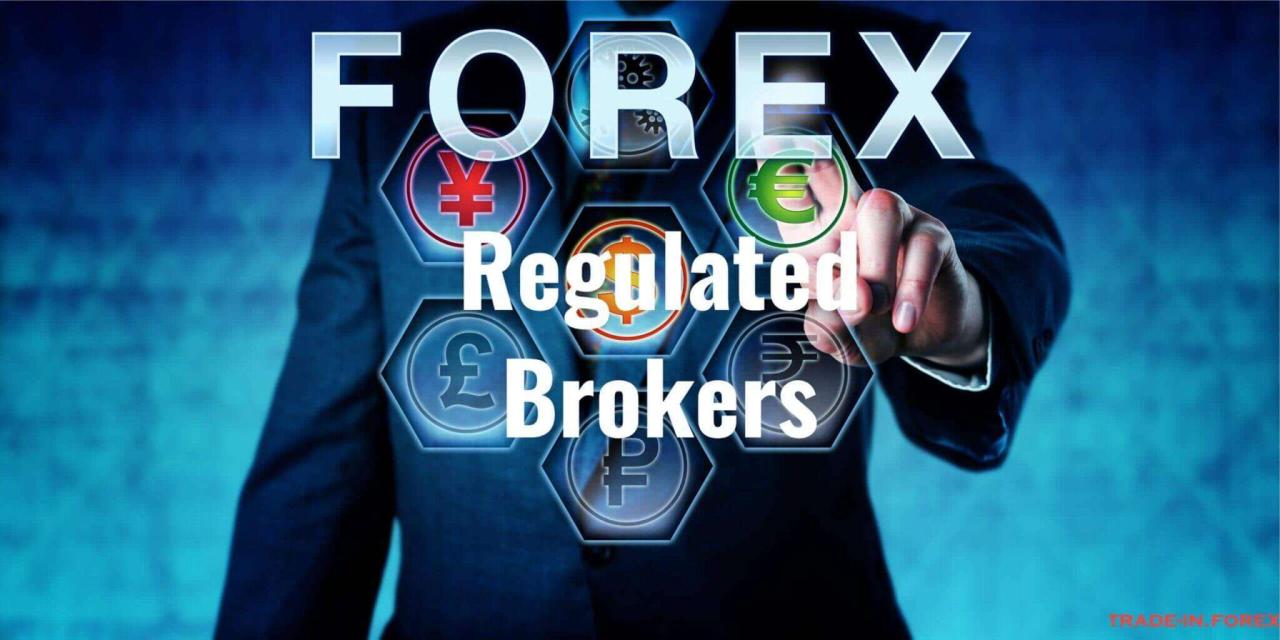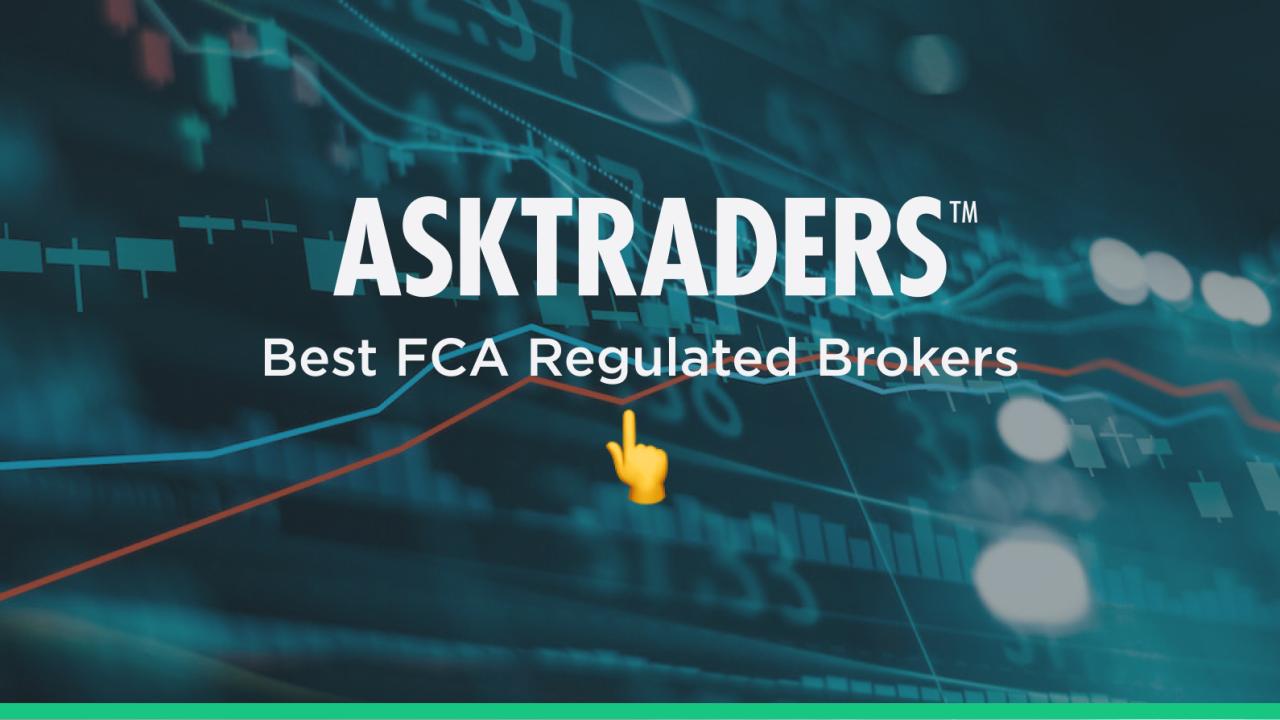
US regulated forex brokers take center stage, offering a secure and transparent trading environment for individuals and institutions alike. Navigating the world of forex trading requires careful consideration, and choosing a broker that adheres to stringent US regulations is paramount. These brokers are subject to oversight by the Commodity Futures Trading Commission (CFTC) and the National Futures Association (NFA), ensuring a level playing field and safeguarding investor interests.
This article delves into the benefits of trading with US regulated forex brokers, outlining the key regulations, advantages, and factors to consider when selecting a broker. We’ll explore the importance of client fund segregation, dispute resolution mechanisms, and the role of these regulators in promoting a trustworthy trading environment. Furthermore, we’ll guide you through the process of opening an account, understanding account types, and navigating trading platforms, all while emphasizing the importance of risk management and understanding US tax regulations.
Understanding US Forex Regulations
The US forex market is one of the largest and most liquid in the world. As such, it is subject to stringent regulations designed to protect investors and ensure fair and orderly markets.
The National Futures Association (NFA)
The NFA is a self-regulatory organization (SRO) that oversees the futures and options industry in the US. It is authorized by the Commodity Futures Trading Commission (CFTC) to regulate forex brokers operating in the US. The NFA’s role includes:
– Registration and oversight of forex brokers: All forex brokers operating in the US must register with the NFA and comply with its rules and regulations.
– Enforcement of rules: The NFA has the authority to investigate and discipline forex brokers that violate its rules.
– Investor protection: The NFA provides resources and education to investors to help them understand the risks and benefits of forex trading.
The Commodity Futures Trading Commission (CFTC)
The CFTC is the primary regulator of the US futures and options markets, including forex trading. It has broad authority to regulate forex brokers and trading activities. The CFTC’s regulations cover areas such as:
– Capital requirements: Forex brokers must maintain a certain level of capital to ensure they can meet their financial obligations.
– Customer funds: Forex brokers are required to segregate customer funds from their own operating funds.
– Trading practices: The CFTC regulates trading practices such as margin requirements, order execution, and disclosure of conflicts of interest.
Key Differences Between Regulated and Unregulated Forex Brokers
The key differences between regulated and unregulated forex brokers in the US are:
- Compliance with regulations: Regulated forex brokers must comply with all applicable US laws and regulations, while unregulated brokers may not. This can lead to risks for investors, such as the potential for fraud or misrepresentation.
- Transparency: Regulated forex brokers are required to be transparent about their business practices and financial condition. This includes providing information about their fees, trading platform, and risk disclosures.
- Investor protection: Regulated forex brokers are subject to oversight by the NFA and CFTC, which provides investors with a level of protection. Unregulated brokers may not be subject to such oversight.
Benefits of Trading with US Regulated Forex Brokers
Trading with a US regulated forex broker offers several advantages, providing traders with a secure and transparent trading environment. These brokers operate under strict regulations, ensuring investor protection and fair market practices.
Investor Protection and Regulatory Oversight
US regulators, such as the Commodity Futures Trading Commission (CFTC) and the National Futures Association (NFA), establish comprehensive rules and regulations for forex brokers operating within their jurisdiction. These regulations aim to protect investors from fraud, market manipulation, and other unethical practices.
- Capital Requirements: US regulated brokers are required to maintain a minimum capital reserve, ensuring they have sufficient financial resources to meet their obligations and cover potential losses. This safeguards client funds in case of unforeseen circumstances.
- Financial Reporting and Transparency: Brokers are obligated to submit regular financial reports to regulators, providing transparency into their operations and financial health. This allows regulators to monitor compliance and identify potential risks.
- Client Account Segregation: US regulations mandate that client funds be segregated from the broker’s own funds, preventing brokers from using client money for their own purposes. This ensures that client assets are protected in case of a broker’s insolvency.
- Anti-Money Laundering (AML) and Know Your Customer (KYC) Measures: US regulations require brokers to implement robust AML and KYC procedures, verifying the identity of their clients and monitoring transactions for suspicious activities. These measures help prevent financial crimes and maintain the integrity of the financial system.
Client Funds Segregation
Client funds segregation is a critical aspect of investor protection in the forex market. It ensures that client money is held separately from the broker’s own funds, reducing the risk of client losses in case of a broker’s financial difficulties.
“Client funds segregation is a key principle of investor protection, ensuring that client money is not used for the broker’s own purposes and is protected in case of a broker’s insolvency.”
US regulated brokers are required to maintain client funds in separate accounts, typically held in reputable banks. This segregation protects client funds from being commingled with the broker’s own assets, providing an additional layer of security.
Dispute Resolution Mechanisms, Us regulated forex brokers
US regulators provide robust dispute resolution mechanisms for traders who have grievances with their brokers. These mechanisms allow traders to seek redress for potential misconduct or unfair treatment.
- NFA’s Dispute Resolution Program: The NFA offers a comprehensive dispute resolution program for traders who have unresolved issues with their brokers. The program provides a fair and impartial process for resolving disputes through mediation or arbitration.
- CFTC’s Complaint Process: The CFTC also provides a formal complaint process for traders to file complaints against brokers. The CFTC investigates complaints and may take enforcement actions against brokers who violate regulations.
Finding and Evaluating US Regulated Forex Brokers
Choosing the right forex broker is crucial for a successful trading experience. With numerous brokers operating in the US market, it’s essential to find one that’s not only regulated but also reputable and trustworthy. This section will guide you through the process of identifying and evaluating US regulated forex brokers, helping you make an informed decision.
Identifying Reputable US Regulated Forex Brokers
Finding US regulated forex brokers is the first step in ensuring a safe and secure trading environment. The National Futures Association (NFA) and the Commodity Futures Trading Commission (CFTC) are the primary regulatory bodies for forex brokers in the US. Brokers regulated by these agencies must adhere to strict rules and regulations, protecting traders from fraudulent activities and ensuring fair market practices.
Here is a list of some reputable US regulated forex brokers, along with their licenses and regulatory status:
- Oanda: Regulated by the CFTC and NFA, Oanda offers a wide range of trading instruments, including forex, CFDs, and precious metals.
- FXCM: Regulated by the NFA, FXCM provides a comprehensive trading platform with advanced charting tools and research resources.
- TD Ameritrade: A well-established brokerage firm regulated by the NFA and FINRA, TD Ameritrade offers forex trading alongside other investment products.
- Interactive Brokers: Regulated by the NFA and FINRA, Interactive Brokers provides a professional-grade trading platform with access to a wide range of global markets.
- AvaTrade: Regulated by the NFA and the Central Bank of Ireland, AvaTrade offers a user-friendly trading platform and competitive spreads.
Comparing Key Features of US Regulated Brokers
Once you’ve identified a few potential brokers, it’s essential to compare their key features to determine the best fit for your trading needs. Here’s a table comparing some of the essential features of different US regulated brokers:
| Broker | Trading Platforms | Spreads | Leverage | Account Types |
|---|---|---|---|---|
| Oanda | Oanda Trade, MT4, MT5 | Variable, starting from 0.9 pips | Up to 50:1 | Standard, Pro, Premium |
| FXCM | Trading Station, MT4, MT5 | Variable, starting from 0.7 pips | Up to 50:1 | Standard, Active, Platinum |
| TD Ameritrade | Thinkorswim, Trade Architect | Variable, starting from 1.2 pips | Up to 50:1 | Cash, Margin, Futures |
| Interactive Brokers | TWS, IBKR Trader | Variable, starting from 0.1 pips | Up to 50:1 | Individual, Joint, Trust |
| AvaTrade | AvaTradeGO, AvaTrade Web, MT4, MT5 | Variable, starting from 0.9 pips | Up to 50:1 | Standard, Pro, Islamic |
Evaluating the Reputation and Trustworthiness of a Forex Broker
Beyond regulatory compliance, it’s crucial to evaluate a broker’s reputation and trustworthiness. This involves examining factors like:
- Client Testimonials and Reviews: Read reviews and testimonials from other traders to gain insights into a broker’s customer service, trading experience, and overall reputation.
- Regulatory Complaints: Check for any regulatory complaints filed against the broker with the NFA or CFTC. This can indicate potential issues with the broker’s practices or compliance.
- Industry Recognition and Awards: Look for awards or recognition received by the broker from reputable financial organizations. This can reflect their performance, innovation, and commitment to excellence.
- Transparency and Disclosure: Ensure the broker provides clear and transparent information about their fees, trading conditions, and risk disclosures.
“Always remember that choosing a regulated forex broker is not just about finding the lowest spreads or the highest leverage. It’s about finding a broker that prioritizes your security, transparency, and fair trading practices.”
Trading with US Regulated Forex Brokers

Trading with US regulated forex brokers offers a secure and transparent environment for forex traders. These brokers adhere to strict regulations, ensuring fair trading practices and client protection. This section will delve into the practical aspects of trading with US regulated brokers, covering the account opening process, available account types, and navigating the trading platform.
Opening an Account with a US Regulated Forex Broker
The process of opening an account with a US regulated forex broker is generally straightforward and involves the following steps:
- Choose a broker: Research and select a US regulated broker that aligns with your trading goals, risk tolerance, and preferences. Consider factors such as trading platform, account types, fees, and customer support.
- Complete the application: Visit the broker’s website and fill out the online application form, providing personal and financial information. This may include your name, address, date of birth, social security number, and employment details.
- Verify your identity: The broker will require you to verify your identity by providing documents such as a driver’s license, passport, or utility bill. This is a standard procedure to comply with anti-money laundering regulations.
- Fund your account: Once your account is approved, you can deposit funds using various methods, such as bank transfer, credit card, or electronic payment systems. The minimum deposit amount may vary depending on the broker.
- Start trading: After your account is funded, you can access the trading platform and begin trading forex pairs.
Account Types Offered by US Regulated Brokers
US regulated brokers offer various account types to cater to the needs of different traders. Here are some common account types:
- Standard account: This is the most basic account type, suitable for beginners and those with smaller capital. It typically has a fixed spread and a minimum deposit requirement.
- Micro account: This account type allows traders to start with smaller lot sizes, making it ideal for beginners or those with limited capital. It may have slightly higher spreads than standard accounts.
- ECN account: ECN (Electronic Communication Network) accounts offer access to raw spreads and deeper liquidity, making them suitable for experienced traders who prioritize low costs and fast execution speeds.
- STP account: STP (Straight Through Processing) accounts route orders directly to the market without intervention, providing transparency and faster execution speeds.
- Islamic account: This account type complies with Islamic principles, prohibiting interest payments and allowing traders to avoid overnight charges. It may have specific trading conditions and requirements.
Navigating the Trading Platform
US regulated brokers typically provide user-friendly trading platforms that offer a range of features and tools for traders. Here’s a general overview of how to navigate a trading platform:
- Login and access your account: Enter your login credentials to access the trading platform. You’ll be able to view your account balance, trading history, and open positions.
- Place orders: Select the forex pair you want to trade, choose the order type (market order, limit order, stop order), and specify the order size and entry price.
- Manage risk: Use stop-loss orders to limit potential losses on your trades. Stop-loss orders automatically close your position when the price reaches a predetermined level.
- Analyze charts: The trading platform provides charting tools to analyze price movements and identify trading opportunities. Use technical indicators, candlestick patterns, and other charting techniques to make informed trading decisions.
- Monitor your trades: Keep an eye on your open positions and adjust your trading strategy as needed. Monitor market conditions and news events that may impact your trades.
Key Considerations for US Forex Traders

Navigating the forex market requires careful consideration of various factors, especially for US traders who operate within a unique regulatory and tax environment. This section will delve into key aspects that US forex traders need to be aware of to make informed decisions and maximize their trading potential.
Understanding Trading Risks and Implementing Risk Management Strategies
Risk management is crucial for any forex trader, but it takes on even greater importance for US traders due to the regulatory landscape. US regulators emphasize investor protection, and forex brokers operating within the US must adhere to strict risk management protocols.
Here are some key considerations:
- Understanding Leverage: Leverage can amplify both profits and losses. US regulators limit leverage for retail forex traders, aiming to mitigate excessive risk-taking. It’s essential to fully comprehend the impact of leverage on your trading positions.
- Stop-Loss Orders: Stop-loss orders are essential risk management tools that automatically close a position when it reaches a predetermined price level, limiting potential losses. US brokers are required to offer and enforce stop-loss orders.
- Margin Requirements: US regulators require forex brokers to maintain specific margin requirements, which are the funds needed to open and maintain a trading position. Understanding these requirements is crucial for managing your trading capital effectively.
- Risk Tolerance: Before entering any trade, assess your risk tolerance. This involves understanding your financial capacity to withstand potential losses and determining how much risk you’re comfortable taking on.
Impact of US Tax Regulations on Forex Trading Profits and Losses
US tax regulations apply to forex trading profits and losses, and understanding these rules is crucial for accurate tax reporting.
- Capital Gains Tax: Profits from forex trading are generally considered capital gains and are taxed at the same rate as other capital gains, depending on your holding period.
- Capital Losses: Forex trading losses can be deducted against capital gains, reducing your overall tax liability. However, there are limits on the amount of capital losses you can deduct in a given year.
- Recordkeeping: Maintaining accurate records of your forex trading activities is essential for tax reporting purposes. This includes details like trade dates, entry and exit prices, and any associated fees.
Choosing the Right Trading Strategy and Tools for US Forex Traders
Selecting the appropriate trading strategy and tools is vital for success in the forex market.
- Trading Style: Consider your trading style and preferences. Some traders prefer scalping, day trading, or swing trading, while others opt for long-term investments.
- Technical Analysis: Technical analysis involves using charts and indicators to identify trading opportunities. Familiarize yourself with common technical indicators and patterns, such as moving averages, MACD, and Bollinger Bands.
- Fundamental Analysis: Fundamental analysis focuses on economic data and events that can influence currency movements. Keep abreast of key economic releases, geopolitical developments, and central bank announcements.
- Trading Platform: Choose a reliable and user-friendly trading platform that offers the features you need. US-regulated brokers typically provide platforms with advanced charting tools, order execution capabilities, and risk management features.
End of Discussion: Us Regulated Forex Brokers

In conclusion, choosing a US regulated forex broker is a crucial step for traders seeking a secure and transparent trading experience. By understanding the regulatory landscape, the benefits of choosing a regulated broker, and the key considerations for US forex traders, you can navigate the world of forex trading with confidence. Remember, a well-informed trader is a successful trader, and choosing a regulated broker is the first step towards achieving your trading goals.
Commonly Asked Questions
What are the main differences between regulated and unregulated forex brokers in the US?
Regulated brokers operate under strict oversight, ensuring investor protection, client fund segregation, and adherence to specific regulations. Unregulated brokers may lack these safeguards, potentially exposing traders to greater risks.
How can I verify if a forex broker is regulated in the US?
You can check the NFA website (www.nfa.futures.org) and the CFTC website (www.cftc.gov) to confirm the regulatory status of a broker. Look for their license number and verify their registration.
What are the benefits of trading with a US regulated forex broker?
Benefits include investor protection, regulatory oversight, client fund segregation, access to dispute resolution mechanisms, and a higher level of transparency and accountability.




